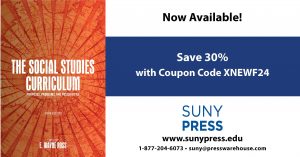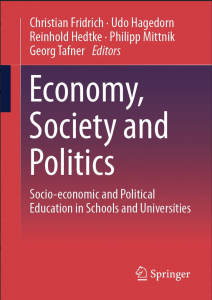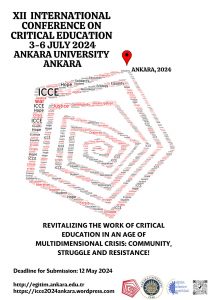
Call for Submissions: Teachers’ Work in Contentious Political Times — Workplace: A Journal for Academic Labor
Deadline for Full-length Submissions: September 30, 2024
Submission Types: Empirical and theoretical papers; interviews; practitioner field reports, or experiential narratives
Review Process: All submissions will be double-blind peer reviewed.
Guest Editors: Denisha Jones (Defending the Early Years), Brianne Kramer (Southern Utah University), Dana Morrison (West Chester University), Erin Dyke (Oklahoma State University), and Lauren Ware Stark (Université de Sherbrooke)
Philosophical Overview/Perspective
While educators have found themselves in a politically contentious profession since the advent of compulsory schooling (Goldstein, 2015), since 2020, they have been caught in a constant onslaught of anti-teacher and anti-education rhetoric, policy, and governance. Guided by the blueprint developed from of decades neoliberal reforms which sought to erode the public good via privatization, standardization, and austerity, Covid-era policy responses imagined new ways to silence, demonize, and discredit educators, attempting to keep them out of critical decision-making as they attended to students’ changing needs during shifting realities (Grooms & Childs, 2021; Hodges et al., 2020). During this time, educators were made to answer for the “crime” of wanting to adhere to scientifically backed safety protocols that would protect the most vulnerable by stemming the spread of the deadly virus. This oftentimes meant keeping school buildings closed until districts could meaningfully uphold CDC protocols (Hoffman et al, 2021; Zhang et al., 2022).
In many locations throughout the U.S., forced reopenings, expiring financial supports, and politicization of Covid-safety measures were the backdrop for conservative-backed parents’ groups taking over school board meetings, picketing outside schools, and harassing school employees at all levels, demanding a return to in-person learning or the ceasing of safety protocols such as mask-wearing, vaccine mandates, and social distancing (Borter et al., 2022; Cunningham, 2023; Nossel, 2022; Williams, 2022). Recognizing the success of these campaigns in several states and against the backdrop of a nation-wide resurgence in teachers’ labor militancy just prior to the pandemic, rightist political networks and organizations like Moms For Liberty (M4L) and Parents Defending Education (PDE) furthered their Koch- and Walton Family-funded agenda to undermine public education. They manufactured a false narrative that teachers were teaching critical race theory (CRT), making spurious claims about socio-emotional learning, and working to ban books that primarily focused on BIPOC and LGBTQ+ characters and issues (Anderson-Nathe, 2020; Asbury & Kim, 2020; Hartney & Finger, 2020; Morgan, 2022). Since 2020, there has been legislation of this kind put forth in nearly every state in the U.S., with many passing laws rooted in these inaccurate and careless claims that censor and punish educators for their work (Collie, 2021; Sachs, 2022). In many places, legislators have also targeted diversity, equity, and inclusion policies, programs, and offices in higher education institutions for dissolution (Cuevas, 2022). Students, staff, and faculty in K12 and higher education have experienced repression for speaking out against censorship and genocide (Hernandez et al., 2024). Yes, the teaching profession was in jeopardy prior to 2020, but now many scholars fear the teaching shortage will continue to worsen.
In the face of reactionary movements and ongoing structural inequalities in education, educators have contributed to a range of struggles to defend public education and counter systems of oppression in schools. These include movements for safety in the Covid-19 pandemic (Maton, 2022; Stark et al., 2024), movements defending the freedom to learn and teach (Giroux, 2024), movements affirming BIPOC (Au, 2021; Curchin et al., 2024; Jones & Hagopian, 2020; Morrison & Porter-Webb, 2019; Ramos & Jani, 2024) and LGBTQIA+ (Shelton et al., 2019) students, and movements for social justice and solidarity unionisms (Charney, Hagopian, & Peterson, 2021; Dyke & Muckian Bates, 2023; Kramer, 2024; Stark, 2023). These movements are both as important and as contested as ever, as educators and the broader public face the threats of rising fascism and, with it, attacks on marginalized communities and those who teach or organize for justice.
Leadership of the American Educational Research Association’s (AERA) Teachers’ Work/Teacher Unions SIG is seeking submissions for a special issue of Workplace: A Journal for Academic Labor. The special issue theme “Teachers’ Work in Contentious Political Times” seeks manuscripts focusing on teachers’ work in P-16 education, teacher unions, or community organizing. In this special issue, we seek empirical and theoretical papers, interviews (with current or retired practitioners, teachers who have left the profession, those in teachers unions, and those in grassroots organizations dedicated to equitable public education) that take a critical approach to the current issues educators are facing.
Critical research seeks to disrupt and expose the status quo and elevate the voices of marginalized and oppressed people through the research process. We are interested in manuscripts that analyze and conceptualize teachers’ work in these current heightened political times. Below are a few suggested topics to include in this volume, but it is by no means exhaustive.
- Educator (birth to 25) response to anti-CRT and LGBTQ+ legislation
- Educator organizing through unions and caucuses to resist attacks
- Grassroots community organizing with educators, parents, students, and activists
- Critical policy and discourse analysis
- Anti-racist, anti-oppressive, and decolonial approaches to teaching and learning enacted as resistance
- Activist research projects
- Topics that historicize and contextualize contemporary policy movements and/or organized resistance
- Educator narratives of political and curricular censorship and/or resistance to censorship
- Critical policy network analyses that makes relations of power shaping educational reform efforts visible and tangible
- Youth participatory action research and/or narratives of student-led organizing
- Empirical studies or narratives that help us to understand how responses to attacks on public education are impacted by tensions or enactments of solidarity among traditionally certified teachers, alternative or emergency certified teachers, education support professionals (i.e., classroom aides, bus drivers), parents/caregivers, justice-oriented community-based groups, and/or students
Tentative Publication Schedule:
Manuscripts due: September 30, 2024
First-Round Editor Decisions: October 5, 2024
Blinded manuscripts sent to reviewers: October 6, 2024
Manuscript Reviews due: December 5, 2024
Editor decisions sent to authors: January 5, 2025
Manuscript revisions due to editors: February 20, 2025
Final Revisions due to editors: March 10, 2025
Special Issue Targeted Release: April 2025
For details on manuscript submission, please see Workplace Information About Submissions
Additional questions can be directed to Brianne Kramer (briannekramer@suu.edu).
References
Anderson-Nathe, B. (2020). Prop It Up or Let It Fall? K-12 Schooling in and after COVID-19. Child & Youth Services, 41(3), 214–218.
Asbury, K. & Kim, L.E.D. (2020). “‘Lazy, lazy teachers”: Teachers’ perceptions of how their profession is valued by society, policymakers, and the media during COVID-19’, PsyArXiv, 20 July, available at: https://doi.org/10.31234/osf.io/65k8q.
Borter, G., Ax, J., & J. Tanfani (2022, February 15). School boards get death threats over race, gender, mask policies. Reuters. https://www.reuters.com/investigates/special-report/usa-education-threats/
Charney, M., Hagopian, J., & Peterson, B. (Eds.). (2021). Teacher unions and social justice: Organizing for the schools and communities our students deserve. Rethinking Schools.
Collie, R.J. (2021). ‘COVID-19 and teachers’ somatic burden, stress, and emotional exhaustion: Examining the role of principal leadership and workplace buoyancy’, AERA Open, 7(1), 1–15.
Cuevas, J. (2022). The Authoritarian Threat to Public Education: Attacks on Diversity, Equity, nd Inclusion Undermine Teaching and Learning. Journal of Language and Literacy Education, 18(2), pp. 1-6. DOI:
Cunningham, M.T. (February 2023). Merchants of deception: Parent props and their funders. Network for Public Education. https://networkforpubliceducation.org/wp-content/uploads/2023/01/Merchants-of-Deception.pdf?fbclid=IwAR2wWJKZSEk1T8to3qoNXxYJe4Ug00Q_nnowZjLc8HKzr4i-LMrPOPp3DzI
Curchin, E., Dahill-Brown, S., & Lavery, L. (2024). Reckoning With the “Other” Pandemic: How Teachers’ Unions Responded to Calls for Racial Justice Amidst COVID-19. Educational Researcher, 0013189X241235634.
Dyke, E., & Muckian-Bates, B. (2023). Rank-and-File Rebels: Theories of Power and Change in the 2018 Education Strikes. WAC Clearinghouse.
Giroux, H. A. (2024). Educators as public intellectuals and the challenge of fascism. Policy Futures in Education, 14782103241226844.
Grooms, A. A., & Childs, J. (2021). “We Need to Do Better by Kids”: Changing Routines in U.S. Schools in Response to COVID-19 School Closures. Journal of Education for Students Placed at Risk, 26(2), 135–156.
Hartney, M.T. & Finger, L.K. (2020). “Politics, Markets, and Pandemics: Public Education’s Response to COVID-19”, working paper. Annenberg Institute, Brown University, Providence.
Hernandez, A. O., Petrow-Cohen, C., & Kaleem, J. (2024 April 18). USC students protest the ‘silencing’ of valedictorian with cancellation of speech. The Los Angeles Times, https://www.latimes.com/california/story/2024-04-18/usc-protest-valedictorian-cancelation
Hodges, C., Moore, S., Lockee, B., Trust, T. & Bond, A. (2020, March 27). ‘The difference between emergency remote teaching and online learning.’ EDUCAUSE Review [online]. Available at: https://er.educause.edu/articles/2020/3/the-difference-between-emergency-remote-teaching-and-online-learning (Accessed 11 July 2021)
Kramer, B. (2024). Activists, Advocates, and Agitators: 21st Century Justice-Oriented Organizing. Myers Education Press.
Jones, D. & Hagopian, J. (2020). Black lives matter at school: An uprising for educational justice. Haymarket Books.
Maton, R. (2022). The Chicago Teachers Union as Counterhegemony: Organized Resistance During COVID-19. In Progressive Neoliberalism in Education (pp. 169-183). Routledge.
Morgan, H. (2022). Resisting the movement to ban critical race theory from schools. Clearing House: A Journal of Educational Strategies, Issues and Ideas, 95(1), 35–41.
Morrison, D., & Porter-Webb, E. (2019). Building power through racial justice: Organizing the# BlackLivesMatterAtSchool Week of Action in K-12 and beyond. Berkeley Review of Education, 9(1).
Nossel, S. (2022, September 20). Parents should have a voice in their kids’ education but we have gone too far. Time. https://time.com/6215119/parents-rights-education-gone-too-far/
Sachs, J. (2024, Jan 24). Steep rise in gag orders, many sloppily drafted. Pen America Freedom to Write https://pen.org/steep-rise-gag-orders-many-sloppily-drafted/
Shelton, S. A., Barnes, M. E., & Flint, M. A. (2019). “You stick up for all kids”: (De) Politicizing the enactment of LGBTQ+ teacher ally work. Teaching and Teacher Education, 82, 14-23.
Stark, L. W. (2023). Learning and knowledge-making in contemporary educator movements. Globalisation, Societies and Education, 21(5), 754-769.
Stark, L. W., Tarlau, R., & Maton, R. M. (2024). ‘For Once We’re Asking for MORE Testing’: organisational infrastructure in the safe schools movement during COVID-19. Globalisation, Societies and Education, 1-16.
Williams, P. (2022, October 31). The right-wing mothers fueling the school board wars. The New Yorker.
Zhang, Y., Mayorga, M.E., Ivy, J., Lich, K.H., & Swann, J.L. (2022). Modeling the impact of nonpharmaceutical interventions on COVID-19 transmission in K-12 schools. MDM Policy & Practice, 7(2), 1–15. DOI: 10.1177/23814683221140866
 Follow
Follow







 XII International Conference on Critical Education
XII International Conference on Critical Education